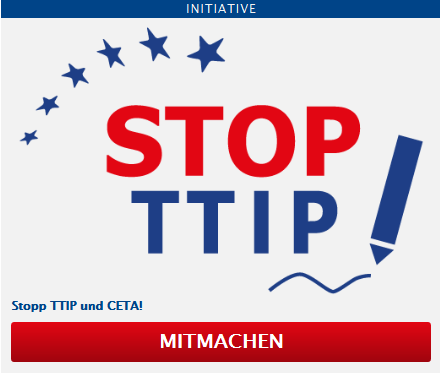Commentary by Thilo Bode: TTIP is not about blinkers
- politics and law
TTIP critics are often referred to as „opponents of free trade“. But that is simply inaccurate. Free trade is central to a well-functioning global economy. There are no objections to fair free trade. However, when the argumentation for free trade is misused as a tool for chipping away at civil rights, there will be resistance – and rightly so. A commentary by Thilo Bode.
Most of the free trade agreements concluded to date have focused primarily on the dismantling of tariffs. However, because the average tariff rate in transatlantic trade is already a mere 2.8 per cent, the Transatlantic Trade and Investment Partnership (TTIP) between the EU and the United States is aimed rather at removing non-tariff trade barriers (NTBs). These NTBs include, for example, differing technical standards which make it more difficult to import and export goods between the two trading blocs. The harmonisation of these standards – e.g. a uniform colour for rear blinkers on cars – reduces costs and stimulates business. No one has anything against this type of harmonisation.
TTIP threatens to erode consumer protection regulations
The problem is that these non-tariff trade barriers are not only differences in blinker colours but also differences in approval procedures for chemicals, in safety standards and labelling requirements for food products and in regulations for decent working conditions. Harmonisation in these areas would directly affect the rights of consumers and workers – which is why TTIP has become such an explosive issue. The elimination of these, not only technical, “barriers” through the alignment of conventions, e.g. requirements and procedures for the approval of processes and products, threatens to erode environmental and consumer protection regulations – above all in the EU, where standards in these areas are generally stricter.
TTIP critics = opponents of free trade?
In this situation, it is simply inaccurate to describe all TTIP critics as „opponents of free trade“. Free trade is central to a well-functioning global economy. There are no objections to fair free trade. But when the argumentation for free trade is misused as a tool for chipping away at civil rights, there will be resistance, and rightly so.
Dominance of the less stringent procedures
In order to allay these fears, the government and trade associations are arguing that TTIP will not undermine consumer, food and environmental standards. However, this reassurance is deceiving EU citizens in at least two different ways.
Firstly, a lowering of standards is already set out in the negotiating mandate of the EU Commission. For example, the mandate allows for a softening of the „precautionary principle“, which is enshrined in EU-law – e.g. in the approval of potentially harmful substances. The precautionary principle requires the banning of any product or activity that raises a reasonable suspicion of causing harm, even in the face of scientific uncertainty. It also constitutes a reversal of the burden of proof: i.e. the manufacturer must prove that its product is safe, not the regulator or the opponents of the product. The EU has made the precautionary principle a cornerstone of its REACH chemicals regulation, putting Europe at the world’s forefront in chemical safety. The US takes a different approach, sometimes referred to as the „sound-science principle“. In simple terms, this principle makes it practically impossible to ban a product until there is clear evidence – e.g. a human death – that it is unsafe. In the context of TTIP, the aim is now to harmonise the differing standards through mutual recognition. Basic economic logic suggests that the recognition of laxer approval procedures in a competitive economy would lead to a dominance of the less stringent procedures.
Maintanance of EU standards: A declaration of bankruptcy
Secondly, the maintenance of EU standards at their current levels – in spite of the exemplary precautionary principle – would have to be viewed not as a success, but as a declaration of bankruptcy. The standards that currently allow for scandalous practices, for example in agriculture, would be frozen: the inhumane methods of animal farming, the excessive use of antibiotics in livestock, the pollution of drinking water through over-fertilisation, the frequent cases of dioxin contamination in milk, meat and eggs, salmonella contamination in the poultry industry and the lack of transparency in the labelling of genetically modified foods – just to name a few examples. In the wake of TTIP, these negative impacts of an industry whose greenhouse-gas emissions are comparable to those of the transport sector would not only be maintained: they would be cemented for decades, as it were, under international law.
TTIP is not about blinkers
The aim of TTIP is to reduce costs for multinationals. Improved standards for the environment, consumers and workers increase costs – and therefore have no place in TTIP. The agreement even includes two powerful mechanisms that would effectively prevent the adoption of more stringent standards: the controversial investor-state dispute-settlement mechanisms, which would make it possible for companies to sue a government over regulations passed in the public interest, and the planned „regulatory cooperation“. The aim of this cooperation is to enable the regulatory authorities on both sides of the Atlantic to coordinate with each other – of course, with the involvement of the industry lobby – in order to avoid differences in regulation before they become a trade hurdle. Given the excessive influence of organised economic interests on the EU regulatory procedures, there is a serious risk that regulatory coordination of this kind would not only support policies that are against the interests of citizens and consumers, but also embed these policies in international law.
In this sense, TTIP is not about blinkers. It is about the elimination of non-tariff trade barriers that the industry considers problematic: consumer rights and a democratically legitimised process of standard setting by the parliaments.
(This text is a guest commentary by Thilo Bode in the FAZ, September 30th.)
